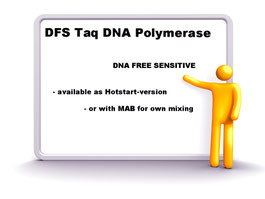DFS PLUS Taq DNA Polymerase
Maximo DFS PlusTaq Polymerase: more sensitivity; more processivity
Features:
DFS-Plus Taq DNA Polymerase provides a new formula in buffers and additives to prevent failures in PCR-applications were inhibitors (e.g. proteins, fat or PS) reduce the performance.
The robust enzyme is well suited for sensitive experiments using random primers or bacterial templates. Because of the high sensitivity less than 6 molecules can be detected.
Application:
Instead of conventionally purified Taq-DNA Polymerase for sensitive PCR reactions, for the detection of bacterial DNA or for applications where inhibitors decrease the performance of regular
polymerases
Reaction conditions:
Same as for conventionally purified Taq-DNA Polymerase.
Concentration
5 units/μl supplied in 10 mM KPO4 (pH 7.4 at 25°C), 0.1 mM EDTA, 0.1% Tween 20, 0.1% Triton-X 100 and 50 % (v/v) glycerol.
Unit Definition
One unit is defined as the amount of enzyme required to incorporate 10 nmoles of dNTP into acid-insoluble material in 30 min at 74°C.
Reaction Buffers provided:
Ammonium-Reaction buffer (10X)” incomplete”
Ammonium-Reaction buffer (10X) “complete” with 25mM MgCl2
MgCl2 (100 mM)
Transport: Shipping at ambient temperature has no negative effects on the performance
of this enzyme.
Storage: at –20 °C is recommended to safeguard against growth of bacteria that may be introduced during handling.
Stability tests / Quality control
Quality Control:
- Endonucleases Incubation of 20 units of the enzyme in 1x reaction buffer
with 1 μg lambda DNA for 16 h
at 65°C in 50 μl yields no detectable degradation of DNA.
- Incubation of 20 units of the enzyme in 1x reaction buffer with 1 μg
lambda DNA EcoR I/Hind III fragments
for 16 h at 65°C in 50 μl yields no detectable degradation of DNA.
- Incubation of 32 units of the enzyme in 1x reaction buffer with 1 μg
supercoiled pUC18 DNA for 16 h at 70° C in 50 μl resulted in no
relaxation.
- Priming activity Incubation of 40 units of the enzyme in 1x reaction buffer
with 100 ng template DNA and
0.2 mM dNTPs each, but without primers in 100 μl resulted in no DNA
synthesis.
- PCR Test Good performance of DNA amplification was confirmed by
using Lambda DNA as template (amplified fragment 12 kb) and human
placenta DNA as template (amplified fragment 3.0 kb).
- No DNA contamination with enterobacterial DNA

| Components | Volume per reaction |
| 10X reaction buffer II | 5 µl |
| 25 mM MgCl2 | 1.5 µl (if necessary) |
| dNTP-Mix (40mM) | 1.0 µl |
| Up-stream primer (10 µM stock) | 0,5-2.5 µl |
| Down-stream primer (10µM stock) | 0.5-2,5 µl |
| Template DNA |
0.1-15 ng/ml plasmid DNA 1-10 µg/ml genomic DNA |
| DFS-PlusTaq DNA Polymerase (5 u/µl) | 0.1 - 0.8 µl |
| Sterile dest. Water (molecular grade) | up to 50 µl total reaction volume |
Note:
- vortex all solutions carefully before using
- dispense all reagents on ice
- add the enzyme after Template DNA
- may you have to optimize the MgCl2 concentration for best result
General Thermo-Cycler protocol:
| Step | Time | Temperature |
| Initial denaturation | 2-5 min | 94-95°C |
|
25-30 Cycles:
Annealing
Extension |
10-25 sec
|
55-65°C |
| Final extension | 5 min | 72°C |
More sensitivity; more processivity, DNA-free
* availibility of sample size may be limited
Final price excl. shipping costs3
- verfügbar / avaílable
- 1 - 3 days for delivery / 1 - 3 Tage Lieferzeit1
Free sample request DFS Taq DNA polymerase
Dear customer, GeneON likes to send free samples to convince the valued customer about the quality. Please understand that the shipping costs may be very high to some destinations. That is the reason why we cannot assure to fulfil all sample requests. Sorry for that, please understand. You may also set an inquiry/order directly by e-mail .
References / Protocols / Notes / Recomendations / Tests
Quality Test:
- Endonucleases Incubation of 20 units of the enzyme in 1x reaction buffer with 1 μg lambda DNA for 16 h at 65°C in 50 μl yields no detectable degradation of
DNA.
- Incubation of 20 units of the enzyme in 1x reaction buffer with 1 μg lambda DNA EcoR I/Hind III fragments for 16 h at 65°C in 50 μl yields no detectable degradation of DNA.
- Incubation of 32 units of the enzyme in 1x reaction buffer with 1 μg supercoiled pUC18 DNA for 16 h at 70°C in 50 μl resulted in no relaxation.
- Priming activity Incubation of 40 units of the enzyme in 1x reaction buffer with 100 ng template DNA and 0.2 mM dNTPs each, but without primers in 100 μl resulted in no DNA synthesis.
- PCR Test Good performance of DNA amplification was confirmed by using Lambda DNA as template (amplified fragment 12 kb) and human placenta DNA as template (amplified fragment 3.0
kb).
- No DNA contamination with enterobacterial DNA










